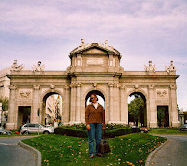Saturday, December 1, 2007
Reality Check: Sub-Prime Crisis More than Just Foreclosures
We're just beginning to hear about the problems the US sub-prime mortgage crisis has created for investors around the world. My question is - will the real villains who, through greed and avarice, bundled, marketed and sold these "securitized mortgages" as viable investment vehicles, ever be held to account? Hint: Don't hold your breath. Meanwhile, officials in a small town in the Arctic Circle in Norway sit in the dark, lights turned off to try and save money, after losing millions invested in Citibank-authored sub-prime investments.
From The New York Times:
U.S. Credit Crisis Adds to Gloom in Arctic Norway
By MARK LANDLER
Published: December 2, 2007
NARVIK, Norway, Nov. 30 — At this time of year, the sun does not rise at all this far north of the Arctic Circle. But Karen Margrethe Kuvaas says she has not been able to sleep well for days.
What is keeping her awake are the far-reaching ripple effects of the troubled housing market in sunny Florida, California and other parts of the United States.
Ms. Kuvaas is the mayor of Narvik, a remote seaport where the season’s perpetual gloom deepened even further in recent days after news that the town — along with three other Norwegian municipalities — had lost about $64 million, and potentially much more, in complex securities investments that went sour.
“I think about it every minute,” Ms. Kuvaas, 60, said in an interview, her manner polite but harried. “Because of this, we can’t focus on things that matter, like schools or care for the elderly.”
Norway’s unlucky towns are the latest victims — and perhaps the least likely ones so far — of the credit crisis that began last summer in the American subprime mortgage market and has spread to the farthest reaches of the world, causing untold losses and sowing fears about the global economy.
Where all the bad debt ended up remains something of a mystery, but to those hit by the collateral damage, it hardly matters. Tiny specks on the map, these Norwegian towns are links in a chain of misery that stretches from insolvent homeowners in California to the state treasury of Maine, and from regional banks in Germany to the mightiest names on Wall Street. Citigroup, among the hardest hit, created the investments bought by the towns through a Norwegian broker.
For Ms. Kuvaas, being in such company is no comfort. People here are angry and scared, fearing that the losses will hurt local services like kindergartens, nursing homes and cultural institutions. With Christmas only weeks away, Narvik has already missed a payroll for municipal workers.
Above all, the residents want to know how their close-knit community of 18,000 could have mortgaged its future — built on the revenue from a hydroelectric plant on a nearby fjord — by dabbling in what many view as the black arts of investment bankers in distant places.
“The people in City Hall were naïve and they were manipulated,” said Paal Droenen, who was buying fish at a market across the street from the mayor’s office. “The fund guys were telling them tales, like, ‘This could happen to you.’ It’s a catastrophe for a small town like this.”
Now, the towns are considering legal action against the Norwegian brokerage company, Terra Securities, that sold them the investments. They allege that they were duped by Terra’s brokers, who did not warn them that these types of securities were risky and subject to being cashed out, at a loss, if their market price fell below a certain level.
“When you sell something that is not what you say it is, that is a lie,” Ms. Kuvaas said. She disputed the suggestion that people here lacked the sophistication to understand what they were buying. “We’re not especially stupid because we live so far in the north,” she said.
Norway’s financial regulator agreed that the brokers had misled the towns, and it revoked the license of Terra Securities, prompting the company to file for bankruptcy. But the company’s parent, Terra Group, which is in turn owned by 78 savings banks and remains in business, rejected calls for it to compensate the towns. A spokesman for the group said it too had taken a hit from the episode.
Norway’s finance minister, Kristin Halvorsen, has ruled out the possibility of a state bailout, and Citigroup, which announced Thursday that it would shut down one of the money-losing investments Narvik bought, said it had no legal obligation to step in.
At City Hall, the stark reality of the situation is starting to set in. Narvik’s chief administrator, Trond L. Hermansen, figures he may recoup half of the town’s $9.4 million investment in the defunct Citigroup product — a package of securities linked to municipal bonds in the United States. Those securities declined in value after the market for bonds dried up.
But Narvik has $34.5 million in a second Citigroup-devised investment, known as a collateralized debt obligation, which has also lost value as a result of the broader market turmoil. The town stands to lose at least some of that money, too.
Those investments represent a quarter of Narvik’s annual budget of $163 million, and covering the losses would necessitate taking out a long-term loan, which the town could only pay off by cutting back on services.
“You can calculate this in terms of places for schoolchildren or help for the elderly,” said Mr. Hermansen, a soft-spoken man who sat in his office in near-darkness, the lights switched off.
As the losses begin to bite, the political finger-pointing has begun. Down the hall from Ms. Kuvaas, the town’s opposition leader, Torgeir Traeldal, is calling for an investigation of how and why Narvik could have made such an ill-advised investment.
“Heads are going to roll,” Mr. Traeldal said, repeating the phrase a few times to drive home his point.
From Mr. Traeldal’s window, cargo ships are visible in Narvik’s harbor, waiting to be loaded with iron ore. They testify to the town’s strategic location, more than 120 miles north of the Arctic Circle, not far from rich ore fields in Sweden. This has long made Narvik a target of opportunity for foreigners.
Hitler viewed the port as an important conquest because it could provide Nazi Germany with an ice-free harbor from which to ship iron ore to build his war machine. The British had similar ideas, and the stage was set for one of the first great naval battles of World War II.
In April 1940, German warships sailed to Narvik. They were met by Norwegian and British ships, and the ensuing clashes left hundreds of sailors dead and the wrecks of more than a dozen destroyers scattered in the fjords.
Narvik’s war history is chronicled in a little museum next to the fish market that attracts visitors from around the world. But it, too, may be a victim of the crisis. Ulf Eirik Torgersen, the director, said the town told him his budget would be cut by 40 percent, which could mean closing.
“That would be a shame,” he said, “because this whole town is based on naval history and war history.”
Nowadays, scuba divers prospect the World War II shipwrecks, part of the town’s busy tourist trade. Like many other Norwegian towns, Narvik also gets hefty tax payments and other revenue from the nearby hydropower plant. That wealth is what got it into trouble.
In 2004, Narvik and a number of other towns took out a large loan, using future energy revenue as collateral. They invested the money, through Terra Securities, in the Citigroup debt vehicle, which offered a better return than traditional investments. In June 2007, as the subprime problems were brewing, Narvik shifted some money from that investment into an even more complex one, again through Terra Securities.
Within weeks, as the market deteriorated, that investment declined in value, and Narvik got a letter from Terra Securities, demanding an additional payment of $2.8 million. Mr. Hermansen said Terra’s brokers never told him that he would be liable for such payments.
The chief investigator of Norway’s financial regulator, Eystein Kleven, said Terra Securities’ Norwegian-language prospectus did not mention such payments, or other risk factors. Citigroup’s term sheet did provide information on risks, but Narvik got a copy only after it had signed the agreement.
“This is the most serious matter we have dealt with in the stock market in the last 10 years,” Mr. Kleven said.
Even if the Norwegian prospectus had been complete, it is not certain that Narvik would have shunned the investment. Ms. Kuvaas, for one, said she did not read the prospectus before voting to authorize it — a decision that was made when she was in the government but not yet mayor. She said the town trusted Terra Securities, with which it had worked since the late 1990s.
To local residents, the bigger question is why Narvik would gamble its future energy revenue on exotic investments.
“We’re upset with our politicians because they should have known better,” said Eileen Jacobsen, 34, a kindergarten teacher. “If this was a private person who did this, people would say, ‘Hello?’”
Ms. Jacobsen, who has a son in kindergarten, said she worried that the town would cut back on resources. Fourteen adults look after 54 children at the kindergarten. But, even without the crisis, Narvik has 40 children on a waiting list for kindergarten, something that is considered almost a right in Norway.
With candles burning in the windows and lights strung on the streets, Narvik and its residents seem determined not to let the losses spoil the season. But late at night, in the Narvik Guten pub, the sadness is palpable. “I really love this town,” said Per Ellingsen, 45, a carpenter who recently returned home after years away. “I’m afraid this is going to set us back 10 years.”
Walter Gibbs contributed reporting from Oslo.
Subscribe to:
Post Comments (Atom)



































No comments:
Post a Comment